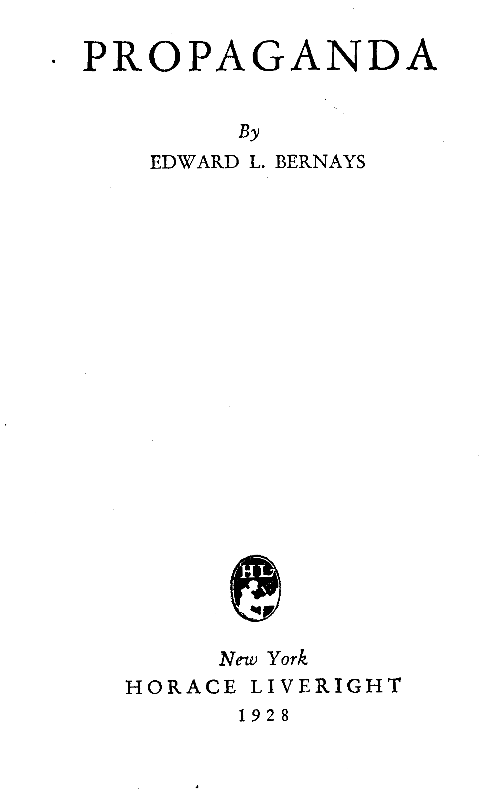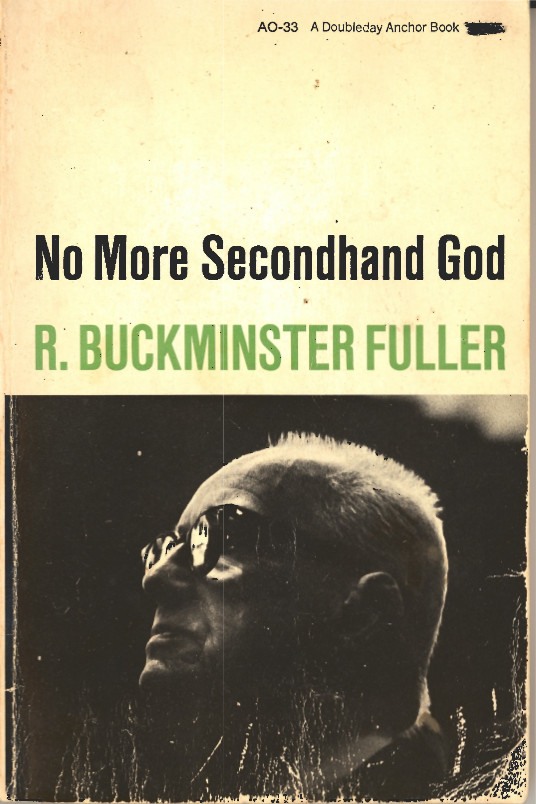Edward L. Bernays: Propaganda (1928)
Filed under book | Tags: · advertising, art, business, democracy, education, marketing, politics, propaganda, psychology, public relations, science

A seminal and controversial figure in the history of political thought and public relations, Edward Bernays (1891–1995), pioneered the scientific technique of shaping and manipulating public opinion, which he famously dubbed “engineering of consent.” During World War I, he was an integral part of the U.S. Committee on Public Information (CPI), a powerful propaganda apparatus that was mobilized to package, advertise and sell the war to the American people as one that would “Make the World Safe for Democracy.” The CPI would become the blueprint in which marketing strategies for future wars would be based upon.
Bernays applied the techniques he had learned in the CPI and, incorporating some of the ideas of Walter Lipmann, became an outspoken proponent of propaganda as a tool for democratic and corporate manipulation of the population. His 1928 bombshell Propaganda lays out his eerily prescient vision for using propaganda to regiment the collective mind in a variety of areas, including government, politics, art, science and education. To read this book today is to frightfully comprehend what our contemporary institutions of government and business have become in regards to organized manipulation of the masses.
Publisher Horace Liveright, New York, 1928
159 pages
The Century Of The Self: One: Happiness Machines (documentary film by Adam Curtis featuring Edward Bernays)
PDF (no OCR)
View online (HTML)
R. Buckminster Fuller: No More Secondhand God and Other Writings (1963/1971)
Filed under book | Tags: · art, machine, science, technology

These prose pieces and prose-poem essays show the development of the thinking of R. Buckminster Fuller, the world-famous inventor of the Geodesic dome. Fuller himself aptly describes these pieces as “mental mouthfuls and ventilated prose.” The title poem No More Secondhand God, written in 1940, proposes practical means for daily or hourly telephone voting by democracy. In another prose-poem Fuller formulates his “comprehensive anticipatory design science.” Each of the pieces in this book is an adventure for the mind; each “generates sublimity of those poetical moments of man’s fleeting glimpses of the omniscient.”
Originally published by Southern Illinois University Press, 1963
Publisher Anchor Books, New York, 1971
145 pages
PDF (no OCR)
Comment (0)Michel Henry: Barbarism (1987/2012)
Filed under book | Tags: · art, capitalism, critique, critique of science, critique of technology, culture, education, philosophy, philosophy of science, science, technology

Barbarism represents a critique, from the perspective of Michel Henry’s unique philosophy of life, of the increasing potential of science and technology to destroy the roots of culture and the value of the individual human being. For Henry, barbarism is the result of a devaluation of human life and culture that can be traced back to the spread of quantification, the scientific method and technology over all aspects of modern life. The book develops a compelling critique of capitalism, technology and education and provides a powerful insight into the political implications of Henry’s work. It also opens up a new dialogue with other influential cultural critics, such as Marx, Husserl, and Heidegger.
First published in French in 1987, Barbarism aroused great interest as well as virulent criticism. Today the book reveals what for Henry is a cruel reality: the tragic feeling of powerlessness experienced by the cultured person. Above all he argues for the importance of returning to philosophy in order to analyse the root causes of barbarism in our world.
Originally published in French as La Barbarie by Editions Grasset & Fasquelle, 1987
Translated by Scott Davidson
Publisher Continuum, London/New York, 2012
Volume 95 of Continuum Impacts
ISBN 1441132651, 9781441132659
168 pages
wikipedia
publisher
google books
PDF
PDF (Alt link, added on 2014-1-21)

